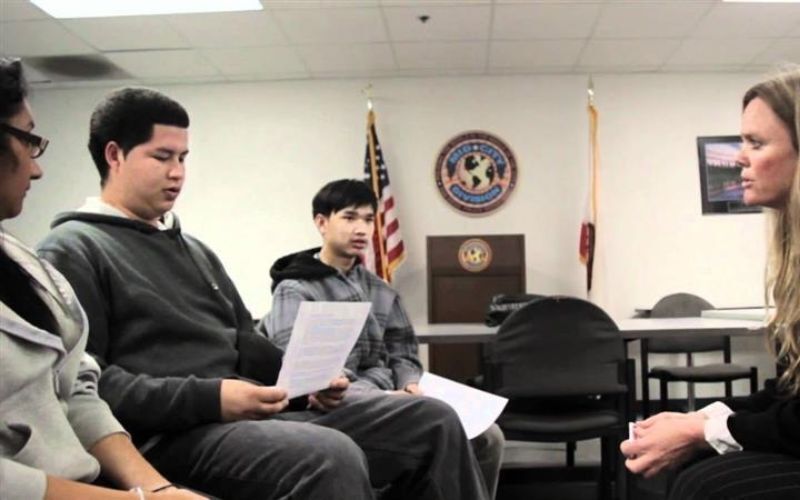Not all Justice Served in a Courtroom: Ex-vandals Grateful for Second Chance through Restorative Justice
by Abigail Curtis
Belfast, Maine
What does justice look like?
In Belfast on Thursday morning, it looked like a circle of people gathered in the Unitarian Universalist Church, dripping melting snow from their boots as they talked, listened and held two young men accountable for their actions a year and a half ago....
“I think justice is a pretty complicated thing,” one of the young men, Will Hurley, said at the outset of the meeting. “[It means] finding a solution that creates the most good for the community.”
The long chain of events that led to this week’s gathering began late one August night in 2012, when three young men from Belfast got drunk and went on a vandalism spree. They broke glass in City Park Pool, then broke windows at the park’s snack stand, at the Belfast Dance Studio and at MacLeod Furniture.
A few days after the vandalism, Hurley, Jacob Denham and Damion Saucier were arrested and charged with the felony crime of aggravated criminal mischief. The young men were given deferred dispositions, meaning that the area’s court diversion program gave them the opportunity to reduce the felony charges to misdemeanors. In order to do that, they had to complete several tasks, including facing their victims, completing many hours of community service and paying a significant amount in restitution.
One of their court-mandated tasks was to work with the Restorative Justice Project of the Midcoast. Sarah Mattox, program coordinator for the non-profit agency, said this week that she was pleased with the referral.
“This was an event that caused such widespread harm in this community,” she said. “It takes a dedicated effort for these individuals to work their way through the reparative agreement process.”
On Thursday, Hurley, now 21, and Denham, now 23, faced community members to tell them what they had done to right their earlier wrongs. Saucier, 21, did not participate in the circle. Mattox said it was unclear why he did not participate and what would happen next for him.
This summer, the trio took part in an initial community resolution conference. At that time, they seemed to waffle back and forth between taking responsibility for their actions and minimizing what they’d done. But by the closing ceremony, Hurley and Denham seemed to have a different attitude.
“The whole thing has really changed me. Getting in trouble. Spending a night in jail,” Hurley said. “I was acting out and taking it out on the community around me, whereas really the biggest impediment to my growth and my happiness was myself.”
He said he went to counseling for substance abuse and depression, did community service at Waterfall Arts in Belfast and taught kids to swim when he returned to college in Massachusetts. He helped paint the Belfast Dance Studio and wrote a self-reflective letter to share with the group.
“I feel very strongly that we all deserve a second chance,” Hurley read from the letter. “I think the program should be all across the country.”
Gusta Ronson, a project mentor, told him she noticed a change.
“I remember from the first go-round that you had an edge,” she said. “You really do seem different to me.”
“At the last meeting, I just wanted to get the hell out,” Hurley replied. “Now, I’m so grateful.”
Denham, who lives and works in Waterville, told the group he’s had an “eventful road.”
“I didn’t expect to see myself change as much as I have,” he said.
He scrubbed toilets and mopped floors at the Alfond Youth Center for his community service. He also went to a therapist and has worked to pay back his $2,500 in restitution and fines while supporting himself on his cook’s paycheck. Denham said he still had several hundred dollars to repay but that he was trying.
“Restorative Justice has helped me in ways I never thought possible,” he said. “I no longer feel as if I’m running in circles with no way out.”
According to Mattox, the two will face judicial review in the coming month to determine their legal fate.
“My sense is that the combination of support and accountability are what anybody deserves,” she said. “To learn from an incident, to repair the harm they’ve done and to move on from it with a clear mind and heart.”
See article from source:

